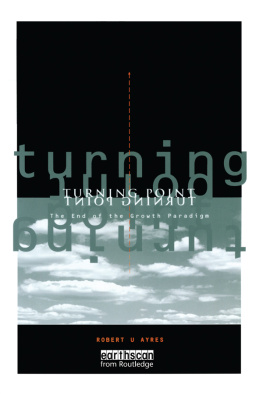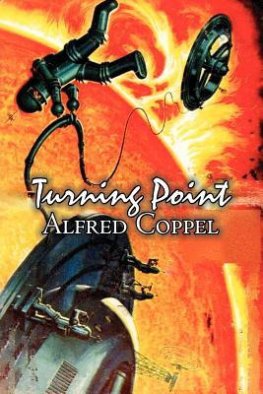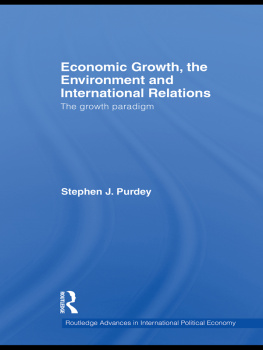Robert U Ayres - Turning point: an end to the growth paradigm
Here you can read online Robert U Ayres - Turning point: an end to the growth paradigm full text of the book (entire story) in english for free. Download pdf and epub, get meaning, cover and reviews about this ebook. City: London, year: 2010, publisher: Taylor and Francis, genre: Politics. Description of the work, (preface) as well as reviews are available. Best literature library LitArk.com created for fans of good reading and offers a wide selection of genres:
Romance novel
Science fiction
Adventure
Detective
Science
History
Home and family
Prose
Art
Politics
Computer
Non-fiction
Religion
Business
Children
Humor
Choose a favorite category and find really read worthwhile books. Enjoy immersion in the world of imagination, feel the emotions of the characters or learn something new for yourself, make an fascinating discovery.
- Book:Turning point: an end to the growth paradigm
- Author:
- Publisher:Taylor and Francis
- Genre:
- Year:2010
- City:London
- Rating:5 / 5
- Favourites:Add to favourites
- Your mark:
- 100
- 1
- 2
- 3
- 4
- 5
Turning point: an end to the growth paradigm: summary, description and annotation
We offer to read an annotation, description, summary or preface (depends on what the author of the book "Turning point: an end to the growth paradigm" wrote himself). If you haven't found the necessary information about the book — write in the comments, we will try to find it.
Turning point: an end to the growth paradigm — read online for free the complete book (whole text) full work
Below is the text of the book, divided by pages. System saving the place of the last page read, allows you to conveniently read the book "Turning point: an end to the growth paradigm" online for free, without having to search again every time where you left off. Put a bookmark, and you can go to the page where you finished reading at any time.
Font size:
Interval:
Bookmark:
On Possible and Impossible Futures
Before plunging headlong into controversy, I want to make some (hopefully) non-controversial remarks about forecasting. It is common for writers who disparage the activity to note that prediction is difficult, especially as concerns the future. Isaac Asimovs Foundation novels feature a psychohistorian genius named Hari Seldon, who has developed a probabilistic theory of social systems. An early scene has Seldon demonstrating to a young research assistant that there is a probability of 92.5 per cent that the galactic empire will collapse into anarchy within 500 years (Asimov, 1951). The notion that any such prediction could be made from a set of mathematical symbols has always tickled my funny bone.
Anybody who has wrestled with forecasting models will share my amusement at the navet of the notion that future history could ever be reduced to a set of equations. We can take it for granted that 100 per cent accuracy in forecasting is impossible. Nevertheless, some important things can be said. One of them is that not all imaginable futures are possible. Some imaginable futures are simply inconsistent with the laws of nature, as far as we know them. (For instance, most of the gadgets and plots of Star Trek violate several of these laws. Unfortunately, it is not only on TV that impossible futures are taken seriously by some people.)
Of course, some possible futures are far more plausible than others. It is imaginable, but very implausible, that all the nations and peoples of the earth would decide spontaneously to disarm, live in peace with each other, and decide all disputes by referendum and a world court. There are, however, still a great many plausible but different futures. It is impossible to predict which among the many plausible ones will come to pass. On the other hand, it is the legitimate business of forecasting to select the most plausible among them for consideration, particularly as a guide to policy. In this context, there are two very different types of forecast. For symbolic reasons, I will call them alpha and omega.
The first type is the alpha forecast or contingent extrapolation. It is a description of the situation that will arise if present social or demographic trends, or policies, continue as currently. An important point to note is that not all contingent extrapolations lead to desirable outcomes. Some outcomes are flatly impossible. Thus the contingent extrapolation may point to a need for policy or behavioral change. In such a case, the forecast is intended to be self-denying.
An interesting example comes from the history of technology. In the early 1940s a vice-president of Bell Telephone Laboratories extrapolated the growth of demand for telephone services for several decades. Then he extrapolated the need for automated central telephone exchanges. Finally he calculated the amount of electric power needed to serve those exchanges (at the time, telephone exchanges were based on electromechanical switches). According to the story, he then noticed that demand for electric power for electromechanical telephone switching would exceed the then current forecasts of total demand for electric power for all purposes.
This was a self-denying forecast. The Bell Laboratories man saw that continued growth of the telephone system would require a new kind of switching technology that would use much less electric power than the (then) current technology. As luck would have it, there were some young physicists at Bell Laboratories who thought that a strange phenomenon in certain transition metals and alloys called semi-conductivity might point the way. Their names were William Shockley, John Bardeen and Walter Brattain. They were assigned to work on the project. The end result was the invention of the transistor, surely one of the dozen or so most important inventions since the wheel. Needless to say, demand for telecommunications has multiplied hundreds of times since then, but demand for electric power to run the telephone system is now almost unnoticeable.
The second type of forecast (omega) is an attempt to describe a desirable distant future and, working back, to delineate possible pathways to that future. It is sometimes called a normative forecast. Such a forecast also has policy implications. Needless to say, an omega forecast is intended to be self-fulfilling, rather than self-denying. An example might be John Kennedys 1962 forecast that an American would land on the moon before the end of the decade. Kennedys forecast was a call to action. It galvanized the Congress to create NASA and to provide the funds needed. The moon landing was achieved, on time, in 1969.
With respect to contingent or alpha extrapolations, there is somewhat more to be said. There are three major points:
- 1) in the absence of a specific reason to think otherwise, an historical trend that is well established is much more likely to continue for a while, than not. Hence, trend extrapolations are generally the safest thing for a short-term forecasting practitioner to do.
- 2) Trends do not always continue; sometimes they cannot. Reversals do occur. (Consider the stock market, for instance.) In fact, trend reversals occur fairly often. Moreover, when trend reversals occur, it is often sudden and surprising, even though the reason for the reversal is usually quite obvious in retrospect.
- 3) Trend reversals are usually important events, sometimes worthy of headlines, whereas linear extrapolations are like old news. The real non-trivial task of a would-be forecaster is to identify likely future reversals and their implications. Unfortunately, the timing is always a major problem. Whereas it is very easy to extrapolate a trend all that is needed is graph paper and a ruler it is extraordinarily difficult to pinpoint the date of a turnaround. One key reason for this is that the turnaround is usually delayed by institutional inertia. When it finally comes, it is more often than not triggered by a random event. Moreover the turnaround, when it finally occurs, is quite sudden and even catastrophic.
With regard to the issue of timing, consider the oil shock of 1973-1974. It occurred because domestic US oil production peaked in 1969-1970 and began to decline. Imports began to rise sharply, and the strategic importance of the Persian Gulf rose in parallel. But these things, in themselves, might not have caused a crisis. The triggering event that brought the Arab world together was the third Arab-Israeli war in 1973, which prompted the Arab oil embargo. The embargo was effective because of the lack of reserve capacity in the US or elsewhere in the world.
How accurately could the timing of the oil shock have been predicted? The best answer to that is that none of the concerned government agencies, major independent forecasting groups, or the oil companies themselves, did foresee it. Only one major oil company, Shell, considered it to be a plausible future scenario in the sense I have used above. Shell, unlike the others, did some strategic contingency planning based on the possibility of something like the events that actually occurred. Shell gained substantially on its competitors thanks to this coup, and now ranks as the worlds most successful oil company. (Curiously, Shells systematic use of scenario analysis for strategic planning has spawned several successful consultancies. But no other large firm, to my knowledge, has actually attempted to do the same thing.)
Many past forecasters have identified likely turnarounds, but failed to predict the timing accurately. I doubt that I could do better. A predicted turnaround with a date attached (such as the many predictions of the end of the world or the second coming of Christ) is an almost certain failure. But a linear trend extrapolation that fails to foresee a turnaround is a far greater failure, at least in my view. If a predicted event occurs early or late but somewhere near the predicted time, and for the reasons proposed, the forecast should be graded as a qualified success.
Font size:
Interval:
Bookmark:
Similar books «Turning point: an end to the growth paradigm»
Look at similar books to Turning point: an end to the growth paradigm. We have selected literature similar in name and meaning in the hope of providing readers with more options to find new, interesting, not yet read works.
Discussion, reviews of the book Turning point: an end to the growth paradigm and just readers' own opinions. Leave your comments, write what you think about the work, its meaning or the main characters. Specify what exactly you liked and what you didn't like, and why you think so.













